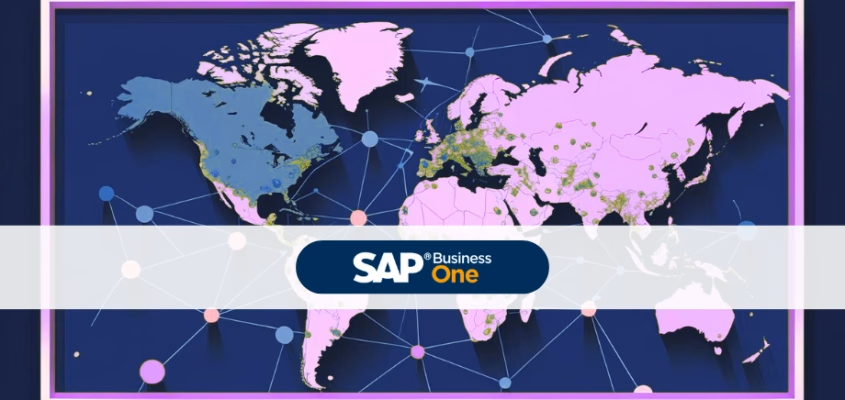Globalisation is no longer just a matter for large corporations. Medium-sized companies are also playing their part in international competition and taking the opportunity to find their own place in the global economic scramble by setting up branches or exporting goods. This is made possible by the right ERP, which, like SAP Business One, exists in a maze of different countries and cultures.
Even if the seven seas are no longer an obstacle, companies still have a few hurdles to overcome in their global expansion. After all, what applies to operations in one country does not necessarily apply to those in another. Depending on the legislation, the company is Currencyaccounting rules, languages and even banking systems to adapt to individual cases. And the demand for compliance with the guidelines in the various countries is increasing.
The expansion to different countries poses a particular challenge for IT. It has to integrate the new office, both the international branches and the acquired companies, into the company's existing IT infrastructure. The ERP system plays the main role here. However, it is important to find a suitable solution that can be integrated uniformly and helps to handle business processes quickly and efficiently across all national borders. In addition, the ERP system should accelerate the flow of information and do across all borders what the system used to do within countries.
Multilingual and Unicode
To ensure that the same ERP solution can be used for branches in different countries, it must be multilingual. It should not be a problem to map, enter and process various documents (e.g. invoices) and regulations in the relevant national language. This is also necessary for companies that do not have a branches abroad, but do business with international companies.
Furthermore, an ERP system that is to be used internationally today must be Unicode-capable. As languages such as Chinese or Russian use special characters, this not only affects the documents, but also the user interface menus and the help system.
Currency and local law
Another important point to make an ERP solution internationally usable is that it must be adaptable to different currencies and legal bases. This is noticeable, for example, when writing invoices, as these must be adapted to all legal and tax requirements of the countries. Particularly in countries such as Brazil, China or Russia, where financial laws or regulations change frequently, an ERP system must be able to adapt to them again and again. This process should be handled by local partners of the ERP providers who are familiar with the requirements of the country. Things like accounting rules also play a role here, chart of accountsThe role of the law, contract law, commercial law and copyright law must be taken into account.
The multi-site function
An equally important point is that the ERP software covers and consolidates all the sites in different countries in their country-specific units, i.e. currencies, quantities or calculations in one (multi-site function). It includes all parts of the company such as production, purchasing and sales, finance and inventory. The right ERP system makes it possible to almost completely automate the process of an international business.
The multi-site function also makes it possible to create and consolidate data on key figures such as sales trends or stock levels for individual branches within a short space of time. This is particularly useful as the data from different countries can be compared better and faster in standardised formats. Such centralised data management thus ensures efficient controlling and a transparent financial plan for a company with international distribution.
Scalable ERP system
An ERP solution that meets the international standard must enable growth for its users and work at many locations as well as at a single one. In addition, the solution should introduce the various functions step by step as required. Especially for small locations in the Abroad or in branch offices with a small number of business workstations, changes often occur to which the system must be adapted. On top of this, these offices should also be able to be operated via a browser.
Implementation and local service
If you want to decide in favour of a particular ERP provider, the implementation of the solution should play a major role in the choice. On the one hand, it is important that there is a local partner who works well with the head office. It is important that these partners are well networked and at home in the culture of the country in question, i.e. that they are competent native speakers and are familiar with the legal regulations and can respond to them if necessary.
On the other hand, both the provider and its partner should use a uniform implementation methodology and proceed in a standardised manner during the rollout, which should ideally be tried and tested. After all, if new partners are added in later years, for example, it should be possible to work with an identical methodology, as the most important company processes are stored in the ERP system.
Reference customers
Of course, the choice of the right ERP solution always depends on personal requirements and the company's industry. However, you can narrow down your choice based on a few points. Firstly, it should be determined which countries will play a role for the company in the future. Secondly, which system will be used by an acquired company, for example. In addition, the provider should be able to name at least one reference from the relevant region from whom you can obtain information about the system and implementation.

Verifactu in Spain: the new invoicing obligation

Group-wide consolidation of ERP systems

SAP Business One 2018 - A preview

International ERP rollout: Strategies for corporate groups

Cosmetics manufacturer successful since 1872 - now also with SAP Business One


